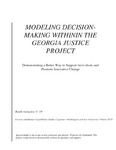Modeling Decision-Making Within the Georgia Justice Project: Demonstrating a Better Way to Support Individuals and Promote Innovative Change

View/
Author
Varnedoe, Heeth, V
Subject
Washington and Lee University, Shepherd Poverty Program
Poverty
Legal assistance to the poor
Discrimination in criminal justice administration
Georgia -- Atlanta
Intersectionality
Metadata
Show full item recordDescription
Capstone; [FULL-TEXT FREELY AVAILABLE ONLINE.] Heeth Varnedoe, V is a member of the Class of 2019 of Washington and Lee University. The American criminal justice system is plagued with inequities. People of color and/or low socioeconomic status are at an extreme disadvantage when they are compelled to interact with the justice system. Over 90% of people involved in the justice system live below the poverty line (GJP 2018). In the face of this issue, many nonprofits and NGOs have been formed to help mitigate the problems associated with the criminal justice system and poverty. These organizations vary in their composition, mission, location, and services provided. This paper will focus on these types of organizations and the ways in which they allocate their resources to achieve their goals. The paper will focus primarily on one specific nonprofit —the Georgia Justice Project (GJP) in Atlanta, GA1. [From Introduction]